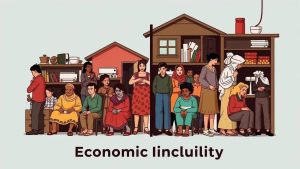Fiscal policy debates: uncover key challenges and solutions

Anúncios
Fiscal policy debates focus on government spending and taxation, directly impacting economic inequality, job creation, and public services, influencing the daily lives of citizens.
Fiscal policy debates significantly influence economic landscapes and daily lives. Have you ever wondered how these discussions shape your community and finances? Let’s delve into the key elements that drive these important conversations.
Understanding fiscal policy debates
Understanding fiscal policy debates is crucial for grasping how governments manage their economies. These discussions involve various aspects, including government spending, taxation, and public services. Knowing the stakes helps us appreciate the impact on our everyday lives.
Anúncios
Key Themes in Fiscal Policy Debates
Several dominant themes often arise in these debates. They shape not just policies but also public perception and economic stability.
- Government Spending: How much the government spends influences economic growth and job creation.
- Taxation: Different approaches to taxation impact citizens’ disposable income and spending power.
- Public Services: The level of funding for services like healthcare and education is a point of contention.
- Debt Management: Balancing spending and revenue impacts national debt and future economic prosperity.
These issues are connected, creating a complex web that demands careful analysis and debate. For instance, a decision to increase taxes might fund vital public services, but it could also limit consumer spending. This trade-off is a frequent point of contention in fiscal policy discussions.
Impact on the Economy
The ramifications of these debates extend to all citizens. Changes in fiscal policy can affect employment rates, inflation, and the overall standard of living. For example, austerity measures can lead to reduced public services, which might adversely impact the health and education sectors.
Anúncios
On the flip side, increased spending during economic downturns can stimulate growth and create jobs. Understanding these dynamics allows readers to engage more critically with the news and policy proposals they encounter daily.
As the discussions evolve, it’s essential for everyone, especially younger generations, to be informed. This awareness empowers citizens to participate in conversations and advocate for policies that align with their values and needs. By grasping the intricacies of fiscal policy debates, individuals can contribute to a more prosperous economic future.
Key issues in fiscal policy discussions

The key issues in fiscal policy discussions play a significant role in shaping economic policies that affect us daily. Understanding these issues helps us grasp how decisions are made and their implications for our lives. Central to these discussions are several important factors that must be examined closely.
Government Budget Deficits
Budget deficits occur when a government’s expenditures exceed its revenues. This topic often sparks heated debates. Many argue whether borrowing is acceptable to stimulate growth.
- Debt Sustainability: Can the government maintain its debt without affecting future generations?
- Impact on Services: How does borrowing affect public services?
- Investor Confidence: High deficits may shake investors’ faith in the economy.
These concerns highlight the complexities involved in deciding on fiscal policies. As a result, the approach to managing budget deficits often varies widely among policymakers.
Taxation Policies
Taxation is another critical issue. Different taxation methods can directly impact individual earnings and economic behavior. Some key considerations include:
- Progressive vs. Regressive Taxes: How do these methods of taxation affect income distribution?
- Tax Incentives: Do tax breaks for certain industries lead to economic growth?
- Public Sentiment: How do taxpayers feel about proposed changes in tax policy?
Understanding these elements allows citizens to engage in informed discussions about taxation’s role in their communities. Public opinion can greatly influence how taxes are structured and perceived.
Spending Priorities
Deciding where government money should go can be contentious. Spending priorities can include education, healthcare, and infrastructure. Each area has passionate advocates who argue for funding. Sometimes, tough choices must be made between necessary services and potential cuts. This balancing act showcases the difficult choices governments face.
As these discussions evolve, it’s essential for everyone to stay informed. Citizens can better advocate for their needs when they understand the implications of these key issues in fiscal policy discussions. Such knowledge not only empowers individuals but also shapes the future direction of public policy.
The role of government spending in economies
The role of government spending in economies is a vital topic that influences many aspects of our daily lives. Government spending affects the economy through investment in public services, infrastructure, and social programs. Understanding how this spending impacts overall economic health is essential for both policymakers and citizens.
Types of Government Spending
Government spending can be categorized into various types, each serving different purposes. Knowing these categories helps to see the bigger picture.
- Discretionary Spending: This includes funding for programs like education and military.
- Mandatory Spending: This covers expenses like Social Security and Medicare that the government is required to pay.
- Capital Spending: Investments in infrastructure, such as roads and bridges, aim to boost economic capacity.
Each type of spending plays a role in shaping the economic landscape. For instance, investing in infrastructure can create jobs and promote economic growth. This financial input can also enhance productivity by making transportation and communication more efficient.
Impact on Economic Growth
Government spending directly influences economic growth. When the government invests in key areas, it typically leads to increased demand in those sectors. More jobs can be created, leading to higher disposable income for families.
Moreover, effective government spending can stimulate business investments. For instance, when the government invests in renewable energy projects, it encourages private-sector investment and can foster innovation in the market. This synergy between government and business can propel the economy forward.
Challenges of Government Spending
Despite its benefits, there are challenges associated with government spending. A common issue is the growing national debt. Increasing expenditures without corresponding revenues can lead to financial instability. Budget deficits can arise, sparking debates on fiscal responsibility and priorities.
Additionally, determining the effectiveness of government programs can be complex. Policymakers must ensure that funds are allocated efficiently and that programs meet their intended goals. This ongoing scrutiny holds governments accountable and ensures they respond to citizens’ needs.
Overall, recognizing the role of government spending in economies helps citizens understand the implications for their communities and lives. Informed citizens can better engage in discussions about spending priorities and advocate for policies that enhance their well-being.
Balancing taxation and public needs

Balancing taxation and public needs is a complex and often contentious issue that affects everyone. Taxes are essential for funding public services like education, healthcare, and infrastructure. However, finding the right balance between effective taxation and meeting public needs can be challenging.
The Importance of Fair Taxation
Fair taxation ensures that everyone contributes to the economic well-being of society. The goal is to create a system where people feel they are paying their fair share, while also receiving necessary services.
- Equity: A fair tax system should distribute the tax burden equitably among different income groups.
- Efficiency: Taxation should not discourage economic activity or investment.
- Transparency: Citizens should understand how their tax dollars are being spent and the benefits they receive.
It’s important for taxpayers to understand how their contributions help fund vital services in their communities. Transparent budgets can build trust in the system and enhance public support.
Challenges in Balancing Needs
Determining how much to tax and where to allocate funds can lead to difficult choices. Governments often have to prioritize where to spend money based on the most pressing public needs.
For instance, during an economic downturn, more funds may be directed towards social services, while infrastructure projects are put on hold. This shift can create tension among different community needs, leading to debates about resource allocation.
In addition, changes in public opinion can significantly impact taxation and spending decisions. Citizens may demand increased funding for certain programs, putting pressure on government budgets. Balancing these demands with fiscal responsibility is a constant challenge for policymakers.
Engaging Citizens in the Process
To effectively balance taxation and public needs, engagement from the community is essential. Citizens should be encouraged to participate in discussions about budget priorities. Public forums and surveys can help gather input and gauge opinions on where funds should be directed.
By involving the community, governments can make more informed decisions that reflect the actual needs of the population. This engagement fosters a sense of shared responsibility between the government and its citizens, enhancing cooperation and support for fiscal policies.
Impacts of fiscal policy on everyday life
The impacts of fiscal policy on everyday life are more significant than many people realize. Fiscal policy encompasses government spending and taxation decisions, which directly influence economic stability and personal finances. Understanding these impacts can help citizens navigate their financial realities.
Influence on Household Budgets
Fiscal policy determines how much money is available for public services, which can affect household budgets. For example, taxes collected can lead to funding for schools, roads, and healthcare.
- Tax Rates: Changes in tax rates can alter how much disposable income families have.
- Subsidies and Benefits: Government benefits and subsidies can enhance financial security, especially for low-income families.
- Public Services: Quality and availability of public services, like education and healthcare, can impact household expenses significantly.
These fiscal decisions shape the amount of money families can spend on necessities and luxuries. Understanding which policies influence these factors is key for financial planning.
Effects on Employment Opportunities
Changes in fiscal policy can also affect job availability. When the government invests in infrastructure projects, for instance, it often creates new jobs. This influx of employment opportunities can boost local economies.
Conversely, austerity measures that cut government spending can lead to fewer jobs, especially in public sectors. This can increase competition for existing positions, ultimately affecting wages and job security.
Broader Economic Implications
Fiscal policy impacts not just individual households but also local and national economies. When people have more money to spend, it stimulates demand for goods and services. This demand can lead to more job creation and business growth.
On the other hand, if fiscal policies create economic uncertainty or instability, it may deter investment and slow down economic growth. Understanding these dynamics is important for citizens who want to engage in discussions about economic policies affecting their lives.
Additionally, public attitudes towards fiscal policy can influence elections and government priorities. Citizen awareness of fiscal issues encourages greater participation in the democratic process, resulting in policies that reflect community needs.
Future trends in fiscal policy debates

The future trends in fiscal policy debates are shaping how governments respond to economic challenges. As economies evolve, so do the discussions surrounding taxes, spending, and government programs. Staying informed about these trends is crucial for understanding future economic landscapes.
Increased Focus on Inequality
One significant trend is a growing emphasis on addressing economic inequality. Many advocates argue that fiscal policy should promote more equitable wealth distribution. This focus can lead to discussions about:
- Progressive Taxation: Adjusting tax rates to place a heavier burden on higher-income individuals.
- Universal Basic Income: Exploring the feasibility of providing a basic income to all citizens.
- Investments in Education: Allocating funds to enhance educational opportunities for low-income families.
Debates on these subjects gain traction as citizens call for policies that support a fairer economy.
Emphasis on Sustainable Practices
As environmental concerns rise, another trend is integrating sustainability into fiscal policy. Governments are focusing on investing in green technologies and renewable energy. This transition can lead to several important discussions:
- Green Tax Incentives: Providing tax breaks for companies that prioritize sustainable practices.
- Infrastructure Investments: Upgrading public transportation and energy systems to reduce carbon footprints.
- Regulatory Frameworks: Establishing regulations that encourage environmentally friendly corporate behavior.
By prioritizing sustainability, fiscal policy can drive innovation and foster a greener economy.
Utilization of Technology in Policy Making
Another emerging trend is the embrace of technology to improve fiscal policy decision-making. Data analytics and machine learning can lead to more informed decisions. With these advancements, policymakers can:
- Measure Impact: Better understand how policies affect different communities through data analysis.
- Enhance Transparency: Use technology to make budget allocations more transparent to citizens.
- Streamline Processes: Improve efficiency in tax collection and government spending.
The incorporation of technology holds great potential in enhancing the effectiveness of fiscal policies.
By considering these trends, citizens can engage in important conversations about the direction of fiscal policy. Understanding how these factors intersect with daily life ensures that individuals remain informed and involved in shaping their economic futures.
The conclusion of the content summarizes the key points discussed regarding fiscal policy and its implications. These discussions are essential for understanding how fiscal policies affect daily life and the economy as a whole. By engaging with emerging trends such as addressing inequality, promoting sustainability, and utilizing technology, citizens can influence future policies. The insights shared encourage readers to remain informed and involved in discussions that shape their economic futures. Ensuring a fair and effective fiscal policy is crucial for fostering a robust economy that meets the needs of all citizens.
FAQ – Frequently Asked Questions about Fiscal Policy Debates
What is fiscal policy?
Fiscal policy refers to government decisions about spending and taxation that influence economic activity.
How does taxation impact everyday life?
Taxation affects disposable income, funding for public services, and overall economic stability, directly influencing daily financial decisions.
Why is inequality a focus in fiscal policy debates?
Addressing inequality is important to ensure fair distribution of wealth and opportunities, helping to create a more equitable society.
How does government spending affect job creation?
Government spending on infrastructure and services can stimulate job creation by increasing demand for labor and supporting local businesses.







